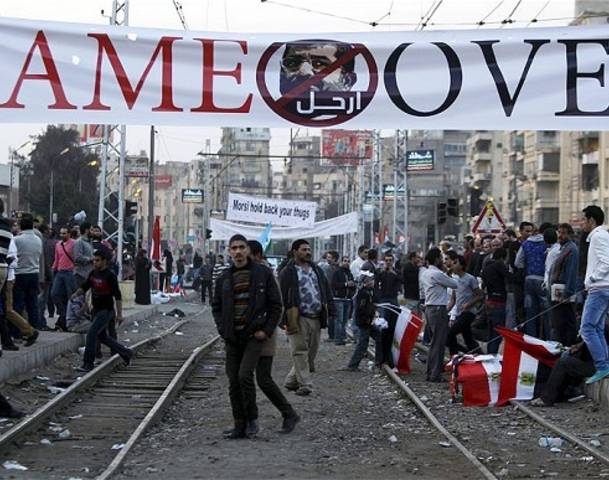
President Mohamed Morsi on Sunday issued Law No. 107 of 2012, granting Egypt’s army police powers, including the right to arrest civilians, in order to preserve security and protect government buildings for a temporary period. The powers are in effect from Monday until the results of the referendum on the draft constitution are announced and legitimate parliamentary elections are held, the decree says.
Earlier, Egypt’s army, which is trying to remain neutral, urged rival political parties to solve their disputes via dialogue and said the opposite would drag the country into a dark tunnel, which they would not allow. A statement issued by the military spokesman, read on state radio and television, said a solution to the political crisis should not contradict legitimacy and the rules of democracy.
Meanwhile, Egypt’s opposition, made up of secular, liberal, left-wing and Christian groups, has said confrontation will continue, and it will escalate its protests to scupper the referendum on a new constitution. Egypt’s opposition will hold mass demonstrations Tuesday in protest of the constitution, which was drafted by a Muslim Brotherhood-led assembly. The constitution’s critics say it disregards the rights of women, ignores personal freedoms and fails to properly represent all Egyptians.
“The leaders of the National Salvation Front call for demonstrations in Cairo and in the regions on Tuesday, as a rejection of the president’s decision that goes against our legitimate demands,” they said in a statement at a news conference. The demonstrations, slated for Tuesday, will coincide with similar rallies planned by the alliance of Islamist Forces, an umbrella group that includes Morsi’s ruling Muslim Brotherhood party under the slogan “Yes to legitimacy” to support the referendum.
Al Jazeera news correspondent reported that tens of thousands have taken to the streets in several Egyptian cities so as to prepare for the demonstrations. Some people are supporting Morsi and others are against him. The bad weather did not stop them from going out for demonstrations. Moreover, the death toll, from last week’s violent clashes outside the presidential palace in Cairo, has reached eight after another victim died of injuries in a hospital, a health ministry spokesman announced.
Medical sources reported previously that more than 880 were injured, of which 23 are in critical and serious condition. In related news, the Middle East News Agency reported that Morsi will visit the United States in 2013, presidential spokesman Yasser Ali said Monday, adding no precise date had been set for the visit.
Opinion:
Since the revolution of July 23, 1952, which overthrew King Farouk, the Egyptian army is known for loyalty to the people and the state, not to the regime. Therefore the Egyptian people hope that the army will not change his attitude and will stick to his principles, especially since Morsi is the first civilian president ruling Egypt. Moreover, Morsi follows the Muslim Brotherhood, which was banned until the period of the popular revolution that toppled Mubarak.
I have already mentioned that the role of the army should be on the borders and not inside the cities to protect polling stations and civil ministries, but it seems that Morsi thought that the presence of the army on the streets will be a deterrent for the people not to demonstrate. Today there will be two demonstrations. According to the government’s decision, the demonstrations are banned. Does this decision apply also on the demonstrations supporting Morsi?
The situation is still dangerous in Egypt. Even if Morsi was able to win the referendum on the disputed draft constitution, Morsi and Muslim Brotherhood should always remember that Morsi was fairly elected with 51.7 percent of the vote, that more than 48 percent did not vote for him. That means that he has to compromise, he has to build consensus.
Apparently, in an attempt to please the people, President Morsi suspended tax raises on a range of products, including alcohol and cigarettes, and tasked PM Hisham Qandil to start talks on the taxes so as not to increase the burden on citizens. The tax hikes also affect steel, cement and other products. However, contrary to what was expected, Morsi’s decision did not lead to any reaction by the Egyptian people who are concerned and worried about the future of their country more than anything else.




